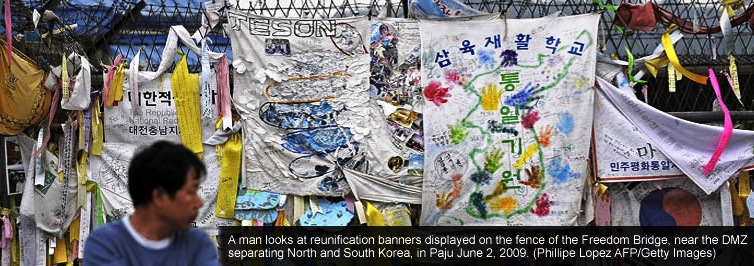![]()
The Words of the Burton Family
|
|
The Words of the Burton Family |

Economists and policy experts who monitor news from the Korean peninsula are divided as to whether the two Koreas could unify in the next few years.
Analyst Peter Beck argued recently in a column published in the Wall Street Journal that the economic costs associated with integrating the radically different economies of the North and South are giving sticker shock to all concerned. Mr. Beck, the Pantech Research Fellow at Stanford University and a professor at Ewha Womans University in Korea writes: "There are three plausible scenarios for a Korean reunification. One would be sudden and bloodless like what Germany experienced. The worst would be a reunification marked by the kind of violence Vietnam suffered. The third is somewhere between the first two and akin to the chaotic post-Communist transitions of Romania and Albania. Any one of these outcomes would be expensive."(To see the full article, go to: online.wsj.com/article/SB10001424052748704340304574635180086832934.html)
Yet Goohoon Kwon, Vice-President and Executive Director at Goldman Sachs, believes that the possible benefits of long-term peace and stability for the Korean peninsula far outweigh any costs that might result from reunification. See www.asiasociety.org/policy-politics/international-relations/intra-asia/united-korea-reassessing-risks or for an in-depth report, read www.nkeconwatch.com/nk-uploads/global_economics_paper_no_188_final.pdf.
Unificationist Dr. Mark P. Barry, Senior Fellow for Public Policy in the Summit Council for World Peace in Washington, D.C., comments, "Senior Korean Unification Church leaders I have interviewed express consensus that unification will have to be gradual over a fairly long period of time. According to some informed observers, the number one issue regarding North Korea is not the nuclear issue but China's overbearing political and economic pressure on the North. In the end, China could forestall or prevent eventual unification, potentially reducing American influence in Northeast Asia at China's gain."
It remains the ardent hope and desire of the Reverend Dr. Sun Myung Moon to see his homeland of North Korea liberated from communism and the two Koreas united. Reverend Moon envisions Korea as a nation that will lead the world into a new era of spirituality and true love. Reverend Moon's ideology is that the ideal form of unification can come about when South Koreans love North Korea more than they love South Korea, and North Koreans love South Korea more than they love North Korea.
Written by Douglas Burton, with a contribution by Tossa Cromwell, Unification Church USA headquarters staff.